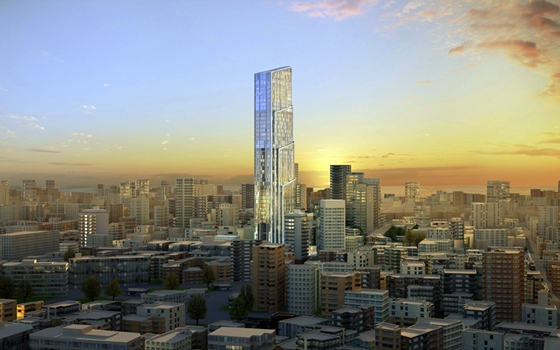The sight of towers rising from Beirut construction sites with cranes and builders working around the hour gives the impression that Lebanon’s economy is doing just fine. In spite of a persistent economic slowdown and series of security lapses over the past years, developers of several multi-hundred-million-dollar real estate projects say their plans in Lebanon have been little affected – albeit perhaps more accommodating of smaller pockets.
“All of our projects are going ahead, in fact there is no reason for reconsidering them. There is no decline as such in the real estate market. … There is a stagnation, but that is something that we have been used to seeing every couple of years,” Amanda el-Hajjar, marketing manager at Plus Holding, told The Daily Star.
“In fact, within two years, we expect the market to boom again … unless in the case of a force majeure.”
Like many leading developers in the country, Plus Properties is on schedule for two major towers in the Beirut Central District and expects delivery next year. The clientele for the two luxury towers remains largely Lebanon’s well-to-do expat community, Hajjar said.
“Sales are not great but they are doing just fine.”
DAMAC Properties, another regional developer, announced on Monday that it completed the third floor slab for its $300 million DAMAC Tower in the Beirut Central District, signaling the development of the luxury tower – which offers Versace Home interior design packages – is also going ahead as scheduled.
“[There is] strong demand for property from Lebanese expatriates who have been working away and want to secure a property to live in when they return home,” said Ziad el-Chaar, the managing director of the company.
In spite of many positive statements from developers, the Lebanese real estate market has posted significant declines since 2011, and many believe the era of superluxury multimillion-dollar apartments is over, with the majority of buyers wanting small affordable apartments in Beirut’s outskirts.
The number of real estate transactions fell 5 percent in the first eight months of 2013, according to statistics released by the Finance Ministry last week, and the value of sales declined 3.9 percent in the same period.
The number of real estate transactions declined 9.9 percent in 2012 – but gained about 3 percent in value – after transactions dropped 11 percent in 2011.
The decline in appetite for real estate is not surprising with the Lebanese economy performing poorly this year. Latest available estimates put real GDP growth at 1.6 percent in 2013, according to a Bloomberg survey of economists and analysts.
Nada Yassine, marketing and sales manager at Prime Consult, the company in charge of the marketing and sales for Sama Beirut – planned to be the highest tower in Lebanon – echoed her colleagues’ views, dismissing any delays for the $200 million development in Ashrafieh.
“We have always promised to deliver by the end of 2014 and we will deliver on schedule,” she told The Daily Star. “We never had doubts about the project and never considered putting it on hold.”
While Yassine agreed that there was lower appetite for luxury real estate, she said that 40 percent of the project had been already sold. Total sales value is expected to reach $300 million, she added.
This week also saw local developer Sayfco announcing a $200 million development in the Kesrouan village of Bqaatouta. A first phase will include 500 chalets and is expected by 2017, the developer has said.
Société Méditerranéenne des Grands Hotels, a group of Lebanese and Saudi investors, also told local media that construction would resume on their long-delayed $90 million Grand Hyatt hotel in Beirut, with delivery planned as early as 2015.
Even larger real estate developments, such as Waterfront City, a $2 billion project planned 15 kilometers northeast of Beirut on the seafront of Dbayyeh, have recently reaffirmed their commitment to finish projects on time.
Phase one of the project has reached 70 percent of sales for a total value of over $320 million, the company said in July.
While their megaprojects may be on time, most developers have been adjusting plans to a market shifting away from the high-end.
Plus Towers is also offering smaller apartments. One online ad touts “new release small units 175 square meters in the heart of Beirut.”
Phase two of Waterfront City will also include smaller, more affordable units that range in size from 75 to 250 square meters, the consortium behind the development recently announced.
Last month, Sama Beirut also announced it was offering smaller than planned units with a surface area of 300 square meters on the upper floors of the tower “in order to keep up with market trend and the growing demand on small and medium apartments.”
“This option does not exist in any other tower in Beirut, as other towers offer apartments of 600 square meters and up on these levels,” Prime Consult CEO Massaad Fares said in a statement.
But confidentially, developers have been discussing the market’s future, an industry source told The Daily Star.
“More and more you will start seeing studios of around 70 square meters, even smaller than what you have in Dubai or New York,” the source said. “Developers are talking [to each other] … and they agree that now is not the time to start building too big.”
The Daily Star
25 September
























































